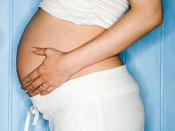Once upon a time, most women had their babies before the age of 35. But now that they are taking their time -- getting an education, developing a career, choosing the perfect mates -- many of them are having their children at a later age. Do pregnant "older" women have more complications in pregnancy and delivery? Will their age compromise their baby's outcome? To learn more, medical contributor and OB/GYN Dr. Judith Reichman from the Today Show (Today 2007) says there are studies that show there is an impact of maternal age on pregnancy outcome, but it is not all bad. Along with the outcome there are a few very important things that can be done prior to conceiving. In this paper a chart will be used to outline an action plan and timeline that will represent what and when women should begin a proactive approach to conceiving later in life.
For decades, doctors have had to rely on small studies in order to answer this very question. And many of these studies included women with medical problems, infertility or even multiple pregnancies. A new study just published in the Journal of the American College of Obstetricians and Gynecologists gives us a better understanding as to whether the risks are greater and what these risks are in "normal" women whose only "deviance" is to be pregnant in her late thirties or early forties. There are studies that show once women who are 35 to 40 are diagnosed with a "normal," viable pregnancy, the outcome will generally be favorable. Her baby should deliver at term with a birth weight comparable to infants born to younger women. She is not significantly more likely to bleed, develop hypertension or preeclampsia, have early labor or need an operative vaginal delivery. Maternal age over 40,


